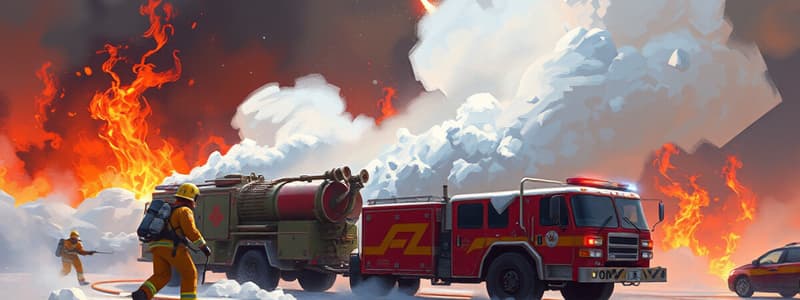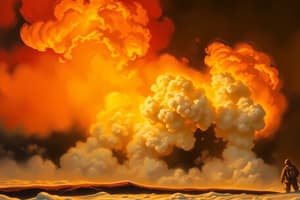Podcast
Questions and Answers
Which foam concentrate is specifically designed for use on Brush Truck/Wildland Apparatus?
Which foam concentrate is specifically designed for use on Brush Truck/Wildland Apparatus?
- Chemguard AFFF
- FireAde 2000 Class A Foam Concentrate (correct)
- FireAde 2000 AR-AFFF
- FireAde 2000 AFFF
What type of equipment must be carried on fire apparatus in relation to foam usage?
What type of equipment must be carried on fire apparatus in relation to foam usage?
- Only Fire Rescue approved foam concentrates (correct)
- Foam concentrates with higher concentrations than 1%
- Generic foam application equipment
- Any foam concentrate available
Which foam is recommended to be carried in 10-gallon extra quantities on Engines?
Which foam is recommended to be carried in 10-gallon extra quantities on Engines?
- Chemguard AFFF
- FireAde 2000 AR-AFFF
- FireAde 2000 Class A Foam Concentrate
- FireAde 2000 AFFF (correct)
What does AFFF stand for in firefighting terms?
What does AFFF stand for in firefighting terms?
Which NFPA standard is related to fire suppression foam products?
Which NFPA standard is related to fire suppression foam products?
Which type of foam should NOT be used for training purposes?
Which type of foam should NOT be used for training purposes?
Which type of foam should be used on aerial equipment according to the guidelines?
Which type of foam should be used on aerial equipment according to the guidelines?
What is the recommended foam application rate for Class B fires involving polar solvents using FireAde 2000 AFFF?
What is the recommended foam application rate for Class B fires involving polar solvents using FireAde 2000 AFFF?
Which of the following statements aligns with the safety protocols for foam usage?
Which of the following statements aligns with the safety protocols for foam usage?
What is one of the requirements for foam tanks on Tenders?
What is one of the requirements for foam tanks on Tenders?
What is the application rate of FireAde 2000 Class A Foam Concentrate for wildland fires?
What is the application rate of FireAde 2000 Class A Foam Concentrate for wildland fires?
Who has the authority to oversee compliance with the foam usage guidelines?
Who has the authority to oversee compliance with the foam usage guidelines?
When should the foam proportioning system be flushed?
When should the foam proportioning system be flushed?
What is the liquid foam concentrate application rate for non-polar solvents in Class B fires?
What is the liquid foam concentrate application rate for non-polar solvents in Class B fires?
Which foam concentrate is suitable for fire suppression of vehicles?
Which foam concentrate is suitable for fire suppression of vehicles?
What should efforts focus on regarding foam runoff?
What should efforts focus on regarding foam runoff?
What is the recommended concentration of FireAde 2000 AFFF for use on all fires unless otherwise directed?
What is the recommended concentration of FireAde 2000 AFFF for use on all fires unless otherwise directed?
Which of the following types of fires is NOT effectively suppressed using firefighting foam according to the guidelines?
Which of the following types of fires is NOT effectively suppressed using firefighting foam according to the guidelines?
During high brush fire activity periods, what type of foam should be stocked and distributed to ensure an uninterrupted supply?
During high brush fire activity periods, what type of foam should be stocked and distributed to ensure an uninterrupted supply?
What is the appropriate equipment to carry FireAde 2000 AR-AFFF?
What is the appropriate equipment to carry FireAde 2000 AR-AFFF?
Which of the following is an example of a non-polar solvent that can be extinguished with Class B foam?
Which of the following is an example of a non-polar solvent that can be extinguished with Class B foam?
What should be done with all firefighting foam concentrates and equipment?
What should be done with all firefighting foam concentrates and equipment?
Which of the following firefighting foam types is specifically cited for use on Airport Crash units?
Which of the following firefighting foam types is specifically cited for use on Airport Crash units?
What constitutes Class A fires as per the firefighting guidelines?
What constitutes Class A fires as per the firefighting guidelines?
Flashcards are hidden until you start studying
Study Notes
Purpose and Authority
- Ensures proper use of fire suppression foam in firefighting and training.
- Authorized by Fire Rescue Administrator and conforms to various NFPA standards: NFPA 11, NFPA 18, NFPA 1901, NFPA 1500.
Scope
- Applies to all Emergency Operations Personnel and Reserves of Palm Beach County Fire Rescue.
Foam Types and Storage
- Only Fire Rescue approved foam concentrates and equipment allowed on apparatus.
- Four foam types carried:
- FireAde 2000 Class A Foam Concentrate (0.1%-1%) for wildland apparatus.
- FireAde 2000 AFFF (3%) for engines, aerials, and tenders.
- FireAde 2000 AR-AFFF (Anti-Rollback) for specific fire scenarios.
- Chemguard 3% AFFF for airport crash units.
Application Guidelines
- Foam should not be used on electrical fires due to increased conductivity risks.
- Must flush foam proportioning systems after each use.
- All foam usage is limited to emergency incidents; training foam available separately.
Application Rates
- FireAde 2000 Class A Foam Concentrate:
- 0.1%-1% for wildland Class A fires.
- FireAde 2000 AFFF Application:
- Class A fires (0.25%-0.5%), vehicles (1%).
- Class B fires:
- Non-polar solvents (0.5%-1.0% for Wetting Agent, 3%-6% for liquid foam).
- Polar solvents (6% for liquid foam).
- FireAde 2000 AR-AFFF:
- 3% for both non-polar and polar solvents in Class B incidents.
Stocking and Distribution
- Each Battalion must maintain adequate foam supplies for emergencies.
- During high brush fire activity, additional supplies of Class A and AFFF foams will be distributed by Support Services.
Uses of Firefighting Foam
- Foam is effective against:
- Class A fires (wildland, ordinary combustibles, vehicles).
- Class B fires or spills (non-polar and polar solvents such as gasoline and kerosene).
Important Considerations
- Maintain environmental safety by preventing foam runoff from entering drains.
- Standard practices follow all relevant standards and manufacturer instructions.
Studying That Suits You
Use AI to generate personalized quizzes and flashcards to suit your learning preferences.




